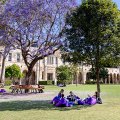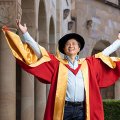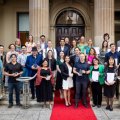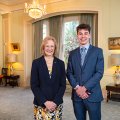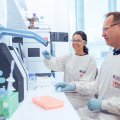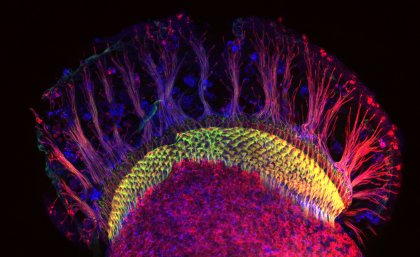
University of Queensland research projects on inflammatory arthritis, infectious diseases and tissue regeneration have won prestigious national awards.
Five UQ researchers have been acknowledged at the National Health and Medical Research Council (NHMRC) awards in Canberra, including Professor David Evans who received the Marshall and Warren Award.
Professor Evans’ research focuses on ankylosing spondylitis (AS), a common chronic inflammatory arthritis which begins in early adulthood.
Deputy Vice-Chancellor (Research) Professor Robyn Ward said the award recognised a highly innovative and potentially transformative project.
“Professor Evans’s project embodies what UQ’s research is about – making a difference to health outcomes.”
There is no known cure for AS, an arthritis that leads to reduced quality of life and lifespan.
Professor Evans, who is Head of Genomics at UQ’s Diamantina Institute, said there were no treatments that prevented the gradual fusing of spinal joints that occurred in many people with the disease.
“Our three-year project involves finding combinations of genes that are related to levels of blood-based biomarkers, and then seeing if these genes are also related to risk of ankylosing spondylitis,” he said.
“If treatments were available to modify the levels of these causal biomarkers, then at least in theory the symptoms of AS could be treated, or perhaps even the disease itself prevented.”
Faculty of Medicine researcher Associate Professor Kiarash Khosrotehrani won an award for being the top-ranked applicant in the Clinical—Level 2 category of the NHMRC’s Career Development Fellowship.
Dr Khosrotehrani leads the experimental dermatology group at UQ Diamantina Institute, and his research focuses on tissue regeneration and skin cancer.
“We are looking at stem cell mobilisation in response to injury with a view to improving treatments of skin wounds and preventing skin cancer,” Dr Khosrotehrani said.
Dr Khosrotehrani is the deputy director of the Australian Skin and Skin Cancer Research Centre in Brisbane and practices at the Princess Alexandra Hospital.
UQ School of Biomedical Sciences team member Joshua Li won the 2017 NHMRC Science to Art Award for an image entitled ‘Biological hardwiring’, of neurons in the developing visual system of a fruit fly.
UQ Institute for Molecular Bioscience researcher Dr Larisa Labzin won the NHMRC Frank Fenner Early Career Fellowship Award for her work in to how bodies fights back against viruses to combat infectious disease.
Dr Labzin’s research could lead to improved treatments for common viruses such as respiratory tract infections, colds, and autoimmune diseases such as lupus.
UQ Centre for Clinical Research Infectious diseases expert Professor David Paterson won the Practitioner Fellowship award, given to the highest ranked applicant in the NHMRC scheme.
Media: Kim Lyell, k.lyell@uq.edu.au, 0427 530647.

